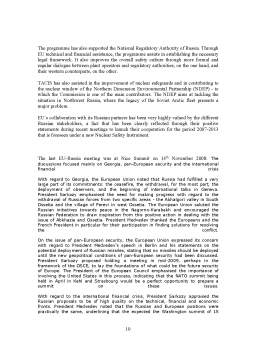Extras din referat
Europe and Russia: Building a Strategic Partnership
The Russian Federation is one of the most important partners for the European Union. A key priority of the European Union is to build a strong strategic partnership with Russia based on a solid foundation of mutual respect. Russia is the largest neighbour of the EU, brought even closer by the union’s 2004 and 2007 enlargements. The 2003 EU Security Strategy highlights Russia as a key player in geo-political and security terms at both the global and regional level. Russia is a key actor in the UN Security Council and, due to history, geographic proximity and cultural links, and is one of the key players in the common European neighbourhood. Russia’s contribution to Europe’s cultural heritage is an important element of their common ties. Russia is also a major supplier of energy products to the EU. Russia is a large, dynamic market for EU goods and services, with considerable economic growth. The EU’s market, on the other hand, is by far the most important destination for Russian exports. Companies from the EU are the main investors in Russia.
Russia and the EU Member States are all members of the United Nations, the Organisation for Security and Cooperation in Europe (OSCE) and the Council of Europe.
They are all committed to upholding and respecting the fundamental values and principles of democracy, human rights, the rule of law and the market economy. These values underpin the EU-Russia bilateral relationship and its legal basis, the Partnership and Cooperation Agreement. The EU has a strong interest in working together with Russia to foster political, social and economic stability, in the region and worldwide. Russia and the EU need to work together to combat new threats to security, as terrorism, crime, illegal migration and trafficking in people as well as drugs. The Russian Federation is also a crucial partner in combating climate change.
The EU and Russia are already cooperating in many ways, including the modernisation of Russia’s economy and its integration into the world economy, security, international issues and cooperation in the common neighbourhood of Eastern Europe.
The EU and Russia have an extensive dialogue on political issues around the world, including the resolution of conflicts such as those in the Middle East, Afghanistan, the Western Balkans and Sudan and preventing the proliferation of weapons of mass destruction and the relevant technologies, as in the cases of Iran and North Korea.
Policy Framework
The legal basis for EU relations with Russia is the Partnership and Cooperation Agreement (PCA) which came into force on 1 December 1997 for an initial duration of 10 years. It sets the principal common objectives, establishes the institutional framework for bilateral contacts, and calls for activities and dialogue in a number of areas.
The Partnership and Cooperation Agreement is based upon the following principles and objectives: the promotion of international peace and security; support for democratic norms as well as for political and economic freedoms. It is based on the idea of mutual partnership - one aimed at strengthening political, commercial, economic, and cultural ties.
The provisions of the PCA cover a wide range of policy areas including political dialogue; trade in goods and services; business and investment; financial and legislative cooperation; science and technology; education and training; energy, cooperation in nuclear and space technology; environment, transport; culture; and on the prevention of illegal activities.
The PCA establishes an institutional framework for regular consultations between the European Union and the Russian Federation as follows:
- At Summits of Heads of State/Heads of Government, which take place twice a year and define the strategic direction for the development of EU-Russia relations.
- At Ministerial level in the Permanent Partnership Council (PPC), to allow Ministers responsible for various policy areas to meet as often as necessary and to discuss specific issues. PPCs have so far been held with the participation of Foreign Ministers, Justice and Home Affairs Ministers, Energy, Transport and Environment Ministers.
- At senior officials and expert level.
- Political dialogue takes place at regular Foreign Ministers meetings, meetings of senior EU officials with their Russian counterparts, monthly meetings of the Russian Ambassador to the EU with the troika of the Political and Security Committee and at expert level on a wide range of topical international issues.
- Since 2005, regular consultations on human rights matters are held.
- Between the European Parliament and the Russian Parliament (State Duma and Federation Council) in the EU-Russia Parliamentary Cooperation Committee. Members from both parliaments meet on a regular basis and exchange views on current issues.
To complement the provisions of the PCA, a number of sectoral and international agreements exist, as well as other mechanisms for cooperation.
Steel and textiles are the main sectors covered by bilateral trade agreements. The latest Steel Agreement covers the years 2007 and 2008. The agreement will end on the day Russia becomes a Member of the World Trade Organization (WTO).
Preview document
Conținut arhivă zip
- EU vs Russia.doc

























